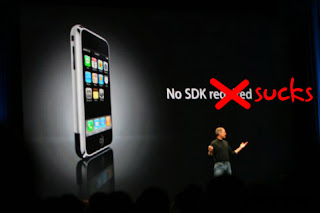
Maybe because iPhone news is thin these days,
Roughly Drafted is revisiting iPhone sales numbers from last quarter. Roughly Drafted's Daniel Dilger points out that of over 4 million smartphones sold in the previous quarter, iPhone sales represented over a million of those, giving the iPhone around 27% smartphone market share. He also points out that the overall smartphone market increased 180% from the previous quarter. From
the article:
"A large chunk of the new growth in smartphones can be attributed to Apple. It’s hard to say whether that’s because the iPhone attracted a new audience to the smartphone market by offering an approachable product, or if Apple simply gobbled up a large portion of the existing demand that would otherwise have resorted to smartphones using software from Palm, Symbian, RIM, or Microsoft."
Using a percentage of the smartphone market share is totally useless because there isn't even a consistent definition of what a smartphone is. In a couple years, what now constitutes a smartphone will simply be known as a cell phone. Using the percentage of overall cell phone market share is much more telling.
"Overall, NPD counted 38 million mobiles sold in the US in the same quarter, which gave Apple almost 3% of all of the nation’s new phone sales in its first full quarter of sales. Incidentally, in just a day and a half of sales in June, Apple sold over 1% of the phones in the previous quarter."
As I've stated before, Apple's eventual matured share of the cell phone market will be determined by the direction they take with future

versions of the iPhone. A $400 cell phone is not an affordable
choice to most people and can't capture as large a portion of the market as the iPod has. Choice is an important word here because buyers can choose from a huge market of free cell phones. Choice, cost, and the cell phone industry's current business model are what really differentiates this market from the mp3 market, rendering iPod comparisons almost useless. Although it is important to note that the current cellular business model is likely to change dramatically if the open network model of the 700 mhz is successful.
This revisiting of past sales for future speculation is like estimating the iPod market's share based on the sales of the first version. But I, of all people, appreciate the need to give people something, anything, to read about the iPhone. Besides, Roughly Drafted is just a great site.
 You know how in Super Mario where you have to push the button at the exact right moment in order to get Mario to jump and hit the block? That precise timing is not possible with the iPhone. Don't believe me? Try the web game Manga Snake on your iPhone. It is one of a dozen examples of iPhone web games that will frustrate you with their reliance on precise directional control.
You know how in Super Mario where you have to push the button at the exact right moment in order to get Mario to jump and hit the block? That precise timing is not possible with the iPhone. Don't believe me? Try the web game Manga Snake on your iPhone. It is one of a dozen examples of iPhone web games that will frustrate you with their reliance on precise directional control.












































